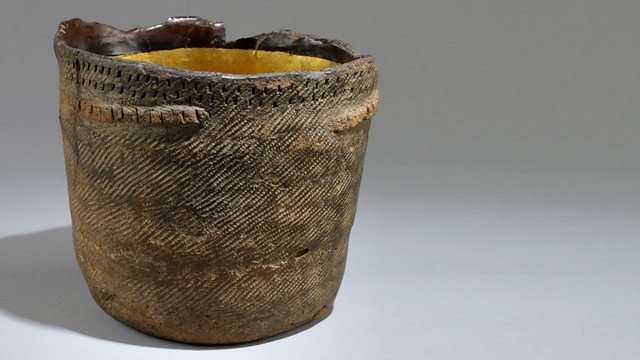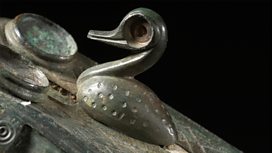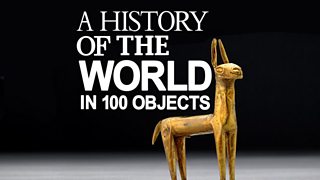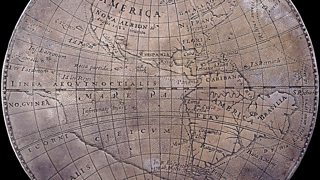Jomon Pot
The early history of cooking and life in Japan told through a 7,000-year-old pot. Neil MacGregor examines a rare example of Jomon pottery and tells the story of a remarkable people
A History of the World told through 100 objects from the British Museum moves to Japan and the story of a 7,000-year-old clay pot which has managed to remain almost perfectly intact. Pots began in Japan around 17000 years ago and, by the time this pot was made, had achieved a remarkable sophistication.
Neil MacGregor, Director of the British Museum, explores the history of this cooking pot and the Jomon; the hunter-gatherer society that made it. The archaeologists Professor Takashi Doi and Simon Kaner describe the significance of agriculture to the Jomon and the way in which they made their pots and used decorations from the natural world around them. This particular pot is remarkable in that it was lined with gold leaf in perhaps the 18th century and used in that quintessentially Japanese ritual, the tea ceremony. This simple clay object makes a fascinating connection between the Japan of today and the emerging world of people in Japan at the end of the Ice Age
Last on
More episodes
Next
You are at the last episode
![]()
Discover more programmes from A History of the World in 100 Objects about food and farming
About this object
Location: Japan
Culture: Early People
Period: About 5,000 BC
Material: Lacquer / Ceramic
��
Jomon pots are the oldest pots in the world. Pottery was invented by people living in Japan, China and Korea during the last Ice Age about 14,000 years ago. Pots allowed people to boil foods such as nuts and shellfish to make them edible. This complete pot was found thousands of years after it was made and put to a new use. During the 1800s the inside was lined with gold foil and lacquered for use in Japanese tea ceremonies.
How did hunter gatherers make pots?
It was once thought that the first pots were invented by farmers. The nomadic lifestyle of hunter-gatherers meant that they were unable to carry pots. The Jomon were hunter-gatherers however, and were able to develop pottery because of Japan's unique environment. They lived in a particularly food rich area - their diet contained over 65 different mammal species. This allowed the Jomon to settle in one place for several years and encouraged the development of pottery for cooking food.
Did you know?
- Jomon means cord-pattern and the Jomon people are named after the rope-like design on their pottery.
What was cooked in ancient pots?
By Rebecca Stacey, Scientist, British Museum
Pots with preserved original contents are very rare.
We cannot fully reconstruct ancient recipes by analysing food residue but we can recognise types of food that were cooked. This helps us to understand the range of foodstuffs that were available in the ancient diet and how the cooking of these foods may have improved their nutritional value or preserved them. So, we can start to understand more about how food resources were managed in the past.
Burnt food deposits are sometimes found on the surfaces of cooking pots and these can be analysed to detect the foods that were cooked.
Even seemingly ‘clean’ vessels often contain the remains of foods which have been soaked-up by the fabric of a vessel. These ‘invisible’ residues are usually better preserved than surface deposits because the ceramic fabric protects them from decay.
Residues are analysed by using a technique known as gas chromatography – mass spectrometry (GC/MS). This separates the molecules of the residue and provides information from which these molecules can be identified. It is a powerful method for understanding what is present in ancient food residues.
Some food stuffs preserve better than others. Fats are insoluble in water and fairly resistant to decay, whereas sugars and proteins are much more likely to be lost over time. For this reason fatty foods – such as meat, fish, dairy products and vegetable oils – are the most commonly detected.
Transcript
Broadcasts
- Fri 29 Jan 2010 09:4591�ȱ� Radio 4 FM
- Fri 29 Jan 2010 19:4591�ȱ� Radio 4
- Sat 30 Jan 2010 00:3091�ȱ� Radio 4
- Fri 24 Apr 2020 13:4591�ȱ� Radio 4
Featured in...
![]()
Food and Farming—A History of the World in 100 Objects
A History of the World in 100 objects - Food and farming
Podcast
-
![]()
A History of the World in 100 Objects
Director of the British Museum, Neil MacGregor, retells humanity's history through objects





